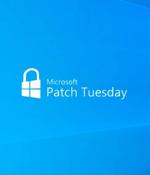Security News

Microsoft on Tuesday revealed that it repelled a cyber attack staged by a Chinese nation-state actor targeting two dozen organizations, some of which include government agencies, in a cyber espionage campaign designed to acquire confidential data. "They focus on espionage, data theft, and credential access," Microsoft said.

Cybersecurity researchers have unearthed a novel rootkit signed by Microsoft that's engineered to communicate with an actor-controlled attack infrastructure. "This malicious actor originates from China and their main victims are the gaming sector in China," Trend Micro's Mahmoud Zohdy, Sherif Magdy, and Mohamed Fahmy said.

Microsoft on Tuesday released updates to address a total of 130 new security flaws spanning its software, including six zero-day flaws that it said have been actively exploited in the wild. The Windows makers said it's aware of targeted attacks against defense and government entities in Europe and North America that attempt to exploit CVE-2023-36884 by using specially-crafted Microsoft Office document lures related to the Ukrainian World Congress, echoing the latest findings from BlackBerry.

Patch Tuesday Microsoft today addressed 130 CVE-listed vulnerabilities in its products - and five of those bugs have already been exploited in the wild. A full list of security updates and advisories in this month's Patch Tuesday batch can be found here from the IT giant, or here from the ZDI. In summary, there are fixes for Windows, Office,.

For July 2023 Patch Tuesday, Microsoft has delivered 130 patches; among them are four for vulnerabilites actively exploited by attackers, but no patch for CVE-2023-36884, an Office and Windows HTML RCE vulnerability exploited in targeted attacks aimed at defense and government entities in Europe and North America. "Microsoft is investigating reports of a series of remote code execution vulnerabilities impacting Windows and Office products. Microsoft is aware of targeted attacks that attempt to exploit these vulnerabilities by using specially-crafted Microsoft Office documents," the company said in the advisory for that particular CVE-numbered vulnerability.

Learn how a malicious driver exploits a loophole in the Windows operating system to run at kernel level. Cisco Talos discovered a new Microsoft Windows policy loophole that allows a threat actor to sign malicious kernel-mode drivers executed by the operating system.

"Microsoft is investigating reports of a series of remote code execution vulnerabilities impacting Windows and Office products. Microsoft is aware of targeted attacks that attempt to exploit these vulnerabilities by using specially-crafted Microsoft Office documents," Redmond said today. "An attacker could create a specially crafted Microsoft Office document that enables them to perform remote code execution in the context of the victim. However, an attacker would have to convince the victim to open the malicious file."

Today is Microsoft's July 2023 Patch Tuesday, with security updates for 132 flaws, including six actively exploited and thirty-seven remote code execution vulnerabilities. "An attacker must have local access to the targeted machine and the user must be able to create folders and performance traces on the machine, with restricted privileges that normal users have by default," warns Microsoft.

Microsoft announced today that it would change the name of its Azure Active Directory enterprise identity service to Microsoft Entra ID by the end of the year. Azure AD offers a range of security features, including single sign-on, multifactor authentication, and conditional access, with Microsoft saying it helps defend against 99.9 percent of cybersecurity attacks.

Microsoft is finally rolling out a driver update to address a known issue causing built-in cameras on ARM-based Windows devices to stop working. Before releasing the updated driver to fix the broken Surface laptop cameras, Microsoft also provided a temporary workaround that can still be used until the update rolls out to all impacted systems.